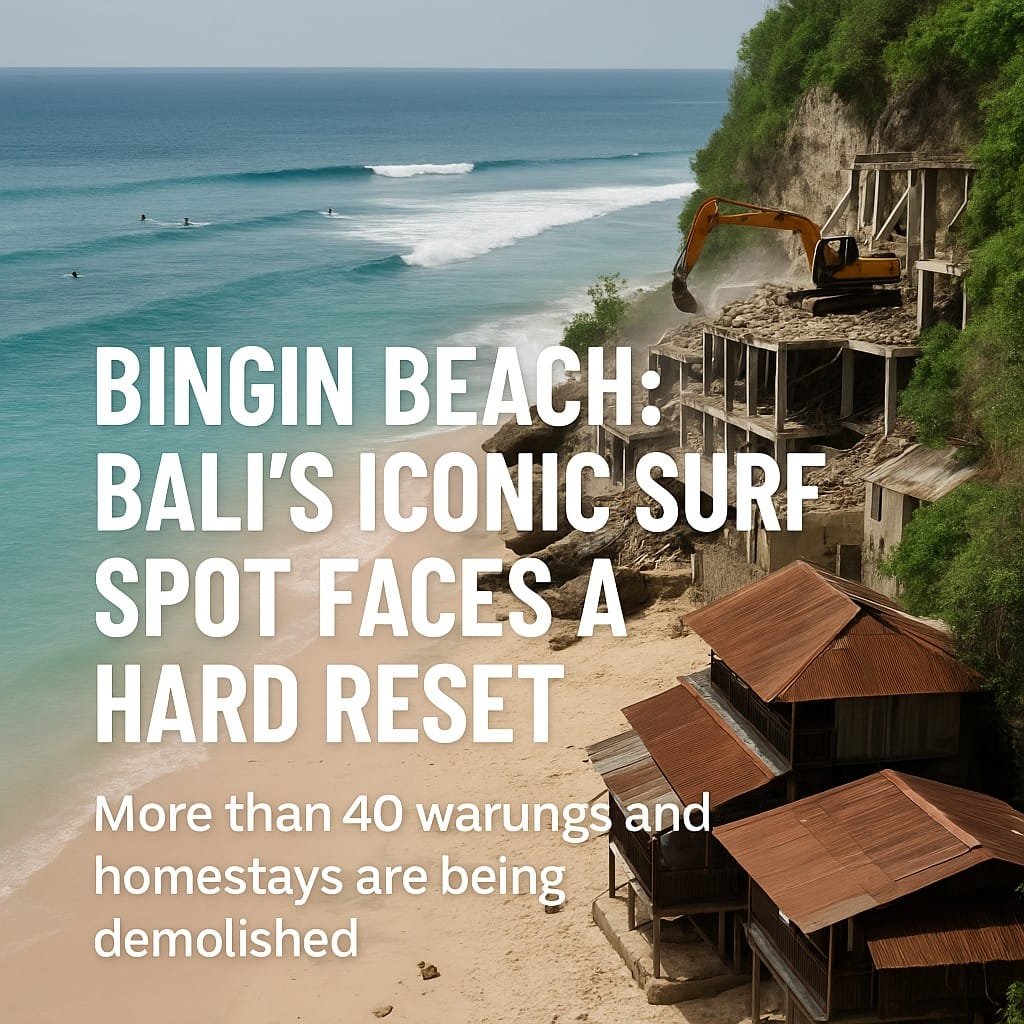Bingin Beach has been a global surf destination since the 1970s, renowned for its world-class waves and laid‑back atmosphere.
Bingin Beach, tucked beneath Bali’s dramatic Bukit Peninsula cliffs, has long attracted surfers, backpackers, and beach lovers from around the world. Its charm lay not just in its perfect reef break and white sand, but in its small, family-run warungs, cliffside homestays, and relaxed, rustic atmosphere.
As of late July 2025, this beloved corner of Bali is undergoing sweeping changes. More than 40 cliffside businesses—including cafes, guesthouses, and small restaurants—are being demolished. The reason? Local authorities have ruled that many of these structures were built without proper permits, encroached on protected coastal areas, and violated zoning laws.
Why Now?
The Bali provincial and Badung regency governments have emphasized that this enforcement is part of a larger plan to protect Bali’s environment and reclaim public spaces. Officials argue that unregulated development has threatened cliff stability, public beach access, and the integrity of coastal management plans.
For years, Bingin operated in a legal gray area. While the beach’s businesses were a draw for tourists, most lacked formal permits or legal building rights. The authorities gave business owners several warnings in early 2025, urging them to dismantle structures voluntarily. When compliance didn’t happen, the government deployed demolition teams in July.
Emotional Reactions and Local Impact
Scenes of the demolitions have been emotional. Local workers and business owners, many of whom have been serving tourists for decades, have expressed heartbreak and frustration. For them, these simple warungs and villas weren’t just businesses—they were their livelihoods. It’s estimated that around 1,000 jobs are now at risk, directly or indirectly connected to Bingin’s cliffside economy.
Tourists have also been caught off guard. Travelers with existing bookings have seen their plans canceled, and many visitors have arrived to find their favorite warungs shuttered and under construction. There’s a sense of mourning for a version of Bingin that, many fear, might be lost forever.
Tip: If you’re planning a visit to Bingin in the coming weeks, be prepared for limited services, construction noise, and detours. Pack snacks, water, and be mindful of beach access routes.
Surfing and Beach Access Remain—For Now
Despite the upheaval, Bingin’s legendary surf remains untouched. The reef break still serves up glassy barrels for experienced surfers, and the beach itself is open to the public. However, the path to the sand may be more complicated in the short term due to demolition zones and construction debris.
Travelers should be cautious when navigating the steep stairways down to the beach. Some pathways may be temporarily closed or unsafe, so checking with locals or accommodation hosts is advised.
A Clash Between Tradition and Development
Many locals and surfers see the demolitions as part of a broader trend: the shift from Bali’s small-scale, community-based tourism toward high-end development. Rumors suggest that the cleared land will eventually host luxury resorts or beach clubs, though officials deny this, claiming the focus is on legal enforcement and environmental sustainability.
Community leaders argue that while regulations are important, the abruptness of the demolitions feels like a heavy blow, especially when no alternative plans have been made to support displaced workers. They worry that the soul of Bingin—the surf community, the small warungs, the personal connections—may be replaced by polished, impersonal resorts catering to wealthier tourists.
What’s Next for Bingin?
As of now, legal battles are ongoing. Many business owners have filed lawsuits, claiming they should have been granted permits or offered solutions short of demolition. The government says it will restore public access to the cliffs and beach, but details remain vague.
In the short term, visitors to Bingin can still enjoy the beach and the waves, though services will be limited. In the long term, the future of Bingin depends on how these legal and cultural battles unfold.
Final Thoughts
Bingin Beach has long been more than just a place to surf—it’s a symbol of Bali’s old-school charm. The current wave of demolitions represents a moment of reckoning for the island, as Bali grapples with how to balance development, environmental conservation, and the livelihoods of its local communities.
For now, Bingin’s waves roll on, but the cliffside culture that once defined this spot is in flux. Travelers are encouraged to experience what remains of Bingin while supporting the local businesses that are still standing.






